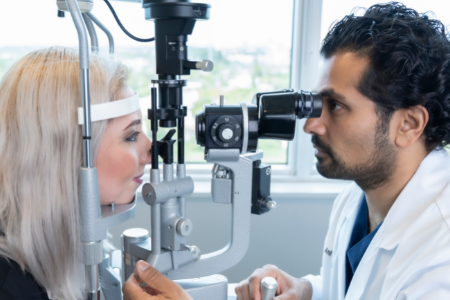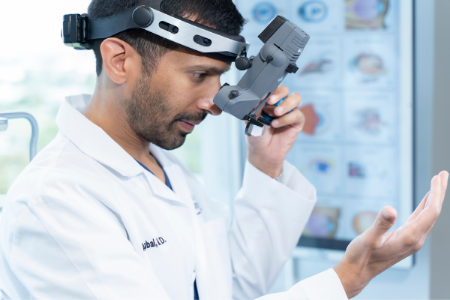
- What is a cataract?
- How does a cataract affect your vision?
- What causes cataracts?
- How do I know if I have a cataract?
- How is a cataract diagnosed?
- What treatments can help my cataracts?
- What happens during cataract surgery?
Fifty percent of people aged 75 and up suffer from trouble with their vision that causes colors to fade, images to blur, difficulty seeing at night, and even double vision. These are the symptoms of cataracts.
What are cataracts? Can they be prevented, and how are they treated? This blog has answers to help you understand this common condition.
What Is a Cataract?
To sum it up, a cataract is a cloudy section of the lens of your eye that obstructs your vision. Cataracts occur naturally as you age, as the proteins in the eye break down and create a cloudy film. Unfortunately, there is nothing you can do to prevent age-occurring cataracts.
In a sense, cataracts are just a normal part of growing older. That’s why you will be very likely to experience a cataract in your lifetime.
How Does a Cataract Affect Your Vision?
 Light rays enter the eye through the cornea at the front of the eye. The light then funnels through the pupil, which acts kind of like the aperture of a camera, widening to let in more light and narrowing when the light is too bright.
Light rays enter the eye through the cornea at the front of the eye. The light then funnels through the pupil, which acts kind of like the aperture of a camera, widening to let in more light and narrowing when the light is too bright.
The pupil allows light to pass through the lens to hit the retina at the back of the eye. The retina converts these light rays to an impulse that is sent through the optic nerve to the brain.
When a cataract forms, the light that is so important to our vision gradually becomes blocked by the formation of crystalline proteins on the lens of the eye. Think of a cataract in the same way you would a car headlight. When your car is new, the headlight is bright and clear. Over time, wear and tear and the elements can cause your headlights to dull and shine less brightly.
Cataracts are quite similar. As your eyes age, the tissue naturally breaks down, gradually hooding clear vision with a milky film. When the lens of your eye is no longer clear, your vision will naturally become affected.
What Causes Cataracts?
There are several types of cataracts, categorized by their cause:
- Age-related cataracts, which are the majority of cases
- Congenital cataracts, which occur in babies born with the disorder
- Secondary cataracts, which are caused by chronic disease or regular steroid use
- Traumatic cataracts, which can happen when the eye is injured
The primary cause of a cataract is the aging process itself. As you age, so do your eyes. What happens structurally is that the fibers and proteins break down in the normally clear lens of the eye. This causes hazy, cloudy vision that can be quite debilitating.
While aging is the number one cause of cataracts, an eye injury can also cause a cataract to form. Inherited genetic disorders can cause cataracts to form, as can chronic illnesses such as diabetes. There are also lifestyle issues that may contribute to cataracts, such as smoking or spending too much time in the sun without eye protection.
In all of these cases, however, the symptoms you experience with a cataract are virtually identical.
How Do I Know If I Have a Cataract?
The symptoms of cataracts include:
- Having blurry or cloudy vision
- Having double vision
- Seeing colors in a way that appears yellow or faded
- Seeing light in a way that is glaring, too bright, or has a halo effect
- Poor night vision
Cataracts, especially those that are age-related, form slowly. One red flag that a cataract is forming is when you notice having to change your eyeglasses prescription frequently. It’s a signal that your eyes are changing. That may be just aging or it could be the beginnings of a cataract. Many times, in the early stages of cataracts, this may be the only symptom you have. As the cataract grows, you’ll start to notice a gradual decline in your ability to see.
If left untreated, cataracts can cause full blindness or permanently impaired vision. Millions of people around the world every year experience blindness caused by cataracts. This is why getting your eyes checked regularly for cataracts is so important.
How Is a Cataract Diagnosed?
The doctor will look for cataracts during your annual eye exam. That’s exactly why these visits are so important to the health of your eye. Interestingly, cataracts in their early stages can resemble other types of eye conditions. So, always see your doctor to confirm the diagnosis and work out a carefully designed personalized treatment plan to help you get better.
During this visit your doctor may undertake several tests, including:
- Visual acuity tests
- Retinal exam
- Applanation tonometry
These tests are painless and non-invasive, and they are a must for ensuring the health of your eyes at all stages of your life.
What Treatments Can Help My Cataracts?

The primary treatment for cataracts is with surgery, a process that replaces the clouded lens with a new clear prosthetic lens. However, your doctor will determine the type of treatment for your cataract by considering:
- Your age
- Your overall health, how sick you are generally, and your clinical and family history
- How well you can handle specific treatments, such as your ability to have a helper during your cataract surgery recovery
- Your preference for treatment
Regular checkups at your eye doctor can detect cataracts in their earliest stages. Then you have an opportunity to adjust your life to potentially slow the progression of the disease or to make changes to help you cope. For example, you may want to invest in better sunglasses or stronger lighting. At some point, these lifestyle changes will not work. That’s when you should talk with your doctor about cataract surgery.
What Happens During Cataract Surgery?
Cataract surgery removes the clouded lens and replaces it with a new, clear, artificial lens called an intraocular lens. This lens is carefully positioned in the eye permanently. This is an outpatient procedure that usually takes less than an hour.
After the surgery, you can go home the same day to heal comfortably. You’ll notice your vision will improve significantly, potentially right after the surgery. Over the weeks following surgery, your eyesight will continue to improve.
Cataracts are a natural extension of the aging process. At Your Eye Specialists, we are uniquely positioned to treat your cataracts. Our team works in a state-of-the-art practice and they are highly qualified to help you get on with your life—without cataracts to slow you down.
